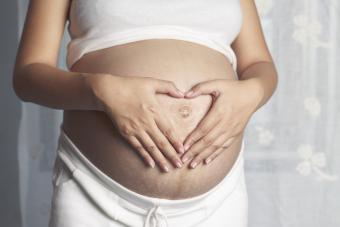
At 20 weeks, you've reached the halfway mark of your pregnancy. Congratulations! By now, you may have felt your baby moving and noticed they are getting more active with each passing day. Your baby's facial features are now formed and their hair, fingernails, and toenails are growing. As you watch your belly get bigger, you may wonder how big your baby is as they kick, punch, twist, and turn around in your womb.
How Big is a 20 Week Old Fetus?
By 20 weeks of pregnancy, your baby is about 10 inches long - the size of a banana - and weighs over 11 ounces. If you haven't had it yet, you will have the opportunity to take a peek at your baby during your anatomy scan (ultrasound). This scan is performed between 18 to 22 weeks and is used to help your doctor check the location of the placenta, measure the amount of amniotic fluid, and look for any signs of congenital disorders. You may get a chance to find out your baby's sex if you don't know yet and want to find out.
During the ultrasound, your doctor or an ultrasound technician will take many measurements of your baby's organs and body parts to make sure your baby is growing and developing appropriately. Fetal measurement ranges at 20 weeks include:
- Head circumference: 6.7 to 7.2 inches
- Femur (thigh bone) length: 1.1 to 2.28 inches
- Abdominal circumference: 5.5 to 6.7 inches
These estimates are based on the World Health Organization's fetal growth chart. Your baby's measurements may be slightly smaller or larger, but if your baby is outside of the normal ranges, your doctor will talk to you about what that may mean.
Your Baby's Development at 20 Weeks
At 20 weeks' gestation, your baby has a regular sleep/wake schedule. Your baby is working on developing their sucking reflex, and you may see them sucking their thumb during your ultrasound. They are also practicing breathing and swallowing.
Other developments at 20 weeks:
- Vernix. Baby's skin is now completely covered in vernix - a white, creamy substance that protects their skin while in the womb.
- Hair growth. The hair on your baby's head is growing, and their whole body is covered in lanugo - soft, fine hair that holds vernix in place and keeps your baby warm until they put on more body fat.
- Skin thickening. Your baby's skin is forming more layers, and sweat glands begin to develop this week.
- Hearing. Your baby's ability to hear sounds is becoming more sensitive, and they may start responding to sounds in your environment, like loud noises or music.
Pregnancy Symptoms at 20 Weeks
You're well into your second trimester at 20 weeks pregnant, and the nausea and fatigue of the first trimester may be replaced with an increased appetite, food cravings, body aches, hair and skin changes, and stretch marks. You may also experience other symptoms, including:
- Nasal congestion. Inflammation of the mucous membranes in the nose (pregnancy rhinitis) can cause a stuffy nose and congestion during pregnancy. Doctors aren't sure what causes increased congestion during pregnancy, but hormonal changes are believed to play a role.
- Leg cramps. Involuntary muscle contractions in the calf and foot are common in the second and third trimesters. Daily stretching, eating foods high in magnesium, and staying hydrated may help reduce the frequency of leg cramps.
- Constipation. A combination of hormonal changes and an expanding uterus can cause constipation during pregnancy.
- Swollen feet. Your body holds extra water weight during pregnancy and produces higher levels of a hormone called relaxin, which helps loosen your muscles, ligaments, and tendons to prepare your body for giving birth.
Pregnancy Tips at 20 Weeks
Now that you've reached the halfway mark of your pregnancy, it may feel as if time is flying by and your baby will be here in no time. Now is a good time to:
- Start preparing for your baby's arrival by getting the nursery ready
- Carve out time for self-care
- Spend extra time with your partner
- Continue eating a healthy, nutrient-dense diet
- Work on your birth plan or consider signing up for a childbirth class
- Remember to take a daily prenatal vitamin
You're Halfway There!
Remember that everyone experiences pregnancy differently. You might not have any food cravings and your shoes might not feel like they're suffocating your feet (though in all likelihood, they will soon). If you're worried about anything though, contact your doctor to discuss.







